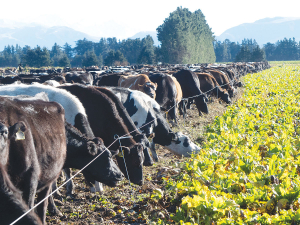As Otago and Southland enters the winter grazing season, MPI says it will have inspectors on the ground ensuring things are being done correctly.
Intensive winter grazing is a farming practice where livestock are grazed on paddocks planted with forage crops. When done poorly it can have negative effects on water quality and animal welfare.
Over the last few years, animal welfare and anti-farming activists have been highlighting poor winter grazing practices - usually sending mainstream media videos and photographs of livestock in muddy, wet conditions. This led to pressure on government and MPI (the Ministry for Primary Industries) to implement stricter conditions on farmers practising winter grazing.
After much conjecture and 18-months of consultation and reworking, less contentious winter grazing rules were recently released by Agriculture Minister Damien O'Connor and Environment Minister David Parker.
These require grazed annual forage crop paddocks to be re-sown as soon as conditions allow, instead of by a set date. Specific requirements around the depth of pugging have been removed and replaced with a duty for farmers to take all reasonably practicable steps to minimise the effects of pugging on freshwater.
Meanwhile, a new condition has been added where critical source areas in winter crop paddocks need to be identified and not cultivated or grazed.
MPI's Gary Orr says inspectors recently conducted proactive visits to Otago and Southland properties, checking that farmers have good plans in place to manage the welfare of their livestock on crops. The focus was on 50 farms identified as being "potentially at risk".
"We'll use these first visits to check in with farmers to make sure they've made the necessary preparations. It will include taking farmers through a practical checklist developed with industry and councils to help improve animal welfare outcomes."
Orr says a well-planned winter grazing system supports good animal health and welfare.
"Some farmers will need to continue adapting their systems to ensure they have more robust back-up plans during extreme weather."
Orr says where there is evidence that an animal is suffering or is likely to suffer, MPI will take action.
"At the low end of the scale it could be the issuing of a directive to move stock or provide acces to stand-off areas away from the feeding area.
"For more serious issues we might bring in vets to make an independent assessment, require the farmer to bring in extra feed, and in the most serious cases taking a prosecution."
He adds that winter grazing time can be a challenging time for farmers as they manage the effects of the weather and possible feed shortages.
"We recommend farmers make contact with their industry organisation for the latest information on winter grazing."
Follow-up visits will again be conducted later this month.
"For the follow-up visits, we'll prioritise those farms which were identified as high-risk in our first phase of visits, as well as any property where we have received complaints," Orr says.



















